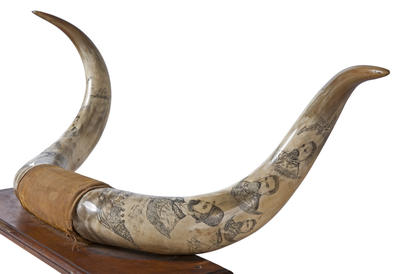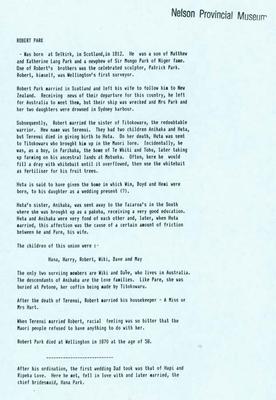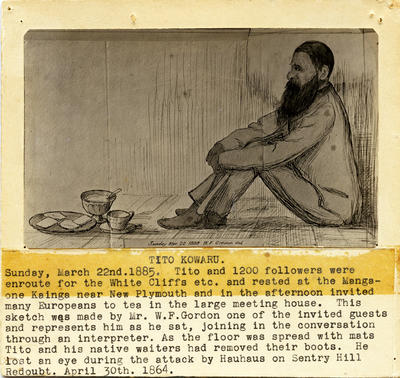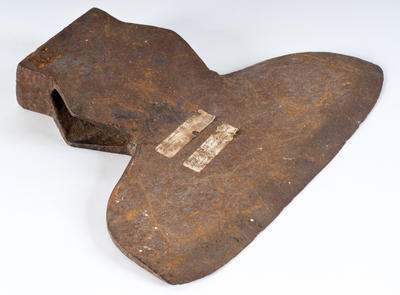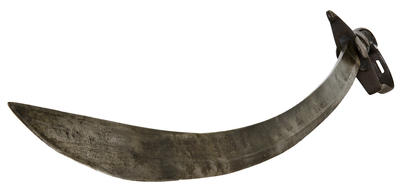Riwha Tītokowaru
Date of birth / Date established
1823
Date of death / Date closed
18 Aug 1888
Biography
Riwha Titokowaru (c. 1823 - 1888) became a Māori leader in the Taranaki region and one of the most successful opponents of British colonisation anywhere.
Riwha was a subtribal leader (having succeeded his father "Titokowaru") of the Ngāti Ruanui iwi in South Taranaki. A lot of what was accomplished by his father had been wrongly attributed to the son; being events of intertribal warring during his time of preadolescence. There is some mystery about his early life, but he is known to have become a Methodist in 1842 having been baptised and given the name of Hohepa Otene (named after the missionary). He joined the "King Movement" and fought in the First Taranaki War in 1860 and 1861 after much provocation from the european-based government.
In 1865 and 1866 British troops conducted a punitive campaign throughout Taranaki, destroying villages whether they supported the King Movement or not. The year 1867 was declared by Titokowaru to be a year of peace. However continual land grabbing by settlers proved intolerable and in 1868 Titokowaru went to war.
In June 1868 Titokowaru's forces destroyed a colonist blockhouse at Turuturumokai, inland of Hawera. The colonial response was to send a large contingent to destroy Titokowaru's stronghold. On 7 September 1868 the colonial forces were defeated with heavy casualties. The stronghold was then abandoned. Amongst the dead was the famous Prussian adventurer Gustavus von Tempsky. Turuturumokai was, previous to becoming a Pākehā garrison, a small Māori encampment, which had been found to be abandoned. Later after careful surveying it was also discovered that, contrary to appearances, Turuturumokai was not as inconquerable as thought by British troops. The Māori decision to leave Turuturumokai was a strategic move.
Titokowaru then advanced southward and defeated a second colonial force at Moturoa. He then stopped at Tauranga Ika and proceeded to build another fortress. Its strength was never tested, as most of Titokowaru's followers abandoned him before the colonials could attack it.
His later understanding of the needed union of two peoples (Māori and settler) was incomparable. He advocated peace and diplomacy between the British and Māoridom. He practiced his own message, demonstrating great tolerance that was noted by many settlers and authority-figures of his time.
Hailed as a warlord, prophet and peacemaker; Titokowaru's remarkable story lapsed into obscurity before being popularised by New Zealand historian James Belich in his works on the Māori wars. He is also the subject of a Maurice Shadbolt novel Monday's Warriors. The character Te Kaipo in the 2005 film River Queen, played by Temuera Morrison, is closely based on Titokowaru.
Riwha was a subtribal leader (having succeeded his father "Titokowaru") of the Ngāti Ruanui iwi in South Taranaki. A lot of what was accomplished by his father had been wrongly attributed to the son; being events of intertribal warring during his time of preadolescence. There is some mystery about his early life, but he is known to have become a Methodist in 1842 having been baptised and given the name of Hohepa Otene (named after the missionary). He joined the "King Movement" and fought in the First Taranaki War in 1860 and 1861 after much provocation from the european-based government.
In 1865 and 1866 British troops conducted a punitive campaign throughout Taranaki, destroying villages whether they supported the King Movement or not. The year 1867 was declared by Titokowaru to be a year of peace. However continual land grabbing by settlers proved intolerable and in 1868 Titokowaru went to war.
In June 1868 Titokowaru's forces destroyed a colonist blockhouse at Turuturumokai, inland of Hawera. The colonial response was to send a large contingent to destroy Titokowaru's stronghold. On 7 September 1868 the colonial forces were defeated with heavy casualties. The stronghold was then abandoned. Amongst the dead was the famous Prussian adventurer Gustavus von Tempsky. Turuturumokai was, previous to becoming a Pākehā garrison, a small Māori encampment, which had been found to be abandoned. Later after careful surveying it was also discovered that, contrary to appearances, Turuturumokai was not as inconquerable as thought by British troops. The Māori decision to leave Turuturumokai was a strategic move.
Titokowaru then advanced southward and defeated a second colonial force at Moturoa. He then stopped at Tauranga Ika and proceeded to build another fortress. Its strength was never tested, as most of Titokowaru's followers abandoned him before the colonials could attack it.
His later understanding of the needed union of two peoples (Māori and settler) was incomparable. He advocated peace and diplomacy between the British and Māoridom. He practiced his own message, demonstrating great tolerance that was noted by many settlers and authority-figures of his time.
Hailed as a warlord, prophet and peacemaker; Titokowaru's remarkable story lapsed into obscurity before being popularised by New Zealand historian James Belich in his works on the Māori wars. He is also the subject of a Maurice Shadbolt novel Monday's Warriors. The character Te Kaipo in the 2005 film River Queen, played by Temuera Morrison, is closely based on Titokowaru.

